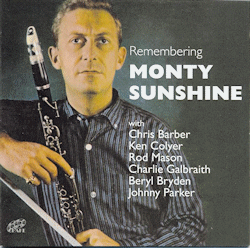Disc One
Playing time 73m. 55s.
1. Wild Cat Blues
2. Slow Drag Blues
3. Blue Blood Blues
4. That Eccentric Rag
5. St. Philip Street Breakdown
6. Careless Love
7. Old Stackolee
8. Original Tuxedo Rag
9. Saturday Night Function
10. South
11. Jacqueline
12. The Sunshine of Your Blues
13. Gimme a Pigfoot & a Bottle of Beer
14. Sobbin’ & Cryin’
15. Creole Love Call
16. 1919 March
17. Coney Island Washboard
18. Sunstroke
19. Down Home Rag
20. Young Woman Blues
21. Cakewalkin’ Babies from Home
22. I Keep Calling Your Name
23. Saratoga Shout
24. Seven of Hearts
25. Put on Your Old Grey Bonnet
(Tracks 1, 4, 6, and 7 previously unissued.)
Recorded between March 1953 and 1965, no locations given.
Disc Two
Playing time 78m. 36s.
1. In the Shade of the Old Apple Tree
2. Monty’s Blues
3. Gonna Build a Mountain
4. Hushabye
5. Spain
6. Ole Miss Rag
7. I Want a Big Butter & Egg Man
8. Up a Lazy River
9. Muskrat Ramble
10. At the Jazz Band Ball
11. Squeeze Me
12. Riverboat Shuffle
13. Too Busy
14. Goin’ Home
(Tracks 6-14 previously unissued.)
Recorded between April 1962 and March 1984, no locations given.
Personnel:
Monty Sunshine – Clarinet on all tracks
All of the others are too numerous to list here, but they include Chris Barber, Ken Colyer, Pat Halcox, and Rod Mason. All data are given in the CD
booklet.
Back before the advent of the Beatles, the traditional jazz revival was underway in the U.K., spear-headed by bands such as George Webb’s Dixielanders, the
Crane River Jazz Band, and the Chris Barber Jazz Band. Monty Sunshine, born in Stepney in London’s East End, on April 8 1928, was a member of the last two
named bands. A young man with the rather unusual last name, apparently an anglicisation of the surname by Sunshine’s great-great-grandparents who were
Romanian immigrants to England, he was the clarinet player with the Crane River Jazz Band and later of the Barber band from its inception until 1960, as
those of us of a certain age will remember, when he left to follow his own course, leading his own groups. This double disc set gives a fair sampling of
the Barber and later periods in Sunshine’s musical career, showcasing well the attributes of his playing.
The 1950s saw a wealth of clarinet talent emerge in the U.K., including Acker Bilk, Cy Laurie, Terry Lightfoot, and Ian Christie,
but none surpassed Sunshine. His tone was always liquid and full, and his control over his instrument was firm. No squeaks, squeals, squawks or other
imperfections sully his playing. Fast fingering and perfect glissandos, when called for, as well as his mellow tone are hallmarks. While he tends to favor
the upper two registers, especially perhaps the middle, he has no problem negotiating the lower one. And, of course, he is a fount of ideas, making his
solos eminently listenable, as well as a composer, as some tunes in this set illustrate.
The first disc opens with a rendition of Wild Cat Blues that even the composer, Sidney Bechet, would have been hard pressed to top. It simply
swings and illustrates how comfortable Sunshine was leading a quartet just as much as he was completing the front line of an ensemble. Another facet of
Sunshine’s playing is the discipline it involves, whether he is with a small group or with a full band. We never hear—or fear—his going off the rails, and
while not tending to read from charts, he has obviously carefully constructed the harmonies with which he backs other instruments, as is very apparent in
the manner he and Rod Mason complement each other in pieces such as Down Home Rag or Saratoga Shout. His obbligato behind Beryl Bryden’s
vocal on Young Woman Blues is superb.
The first disc contains material from the earliest days with Ken Colyer’s Jazzmen and the Chris Barber Jazz Band through tracks by Sunshine’s small
groups—trio, quartets, and quintet. There is also a pair of tracks with Sunshine bands that include Ian Wheeler on soprano sax or second clarinet. The
second disc is given over to Sunshine’s own jazz band with varying personnel, except for the last two tracks, which provide a nostalgic coda as they revert
to the 1984 Chris Barber Jazz and Blues band with a front line of the original Barber band with Colyer on trumpet, the last track being, somewhat
fittingly, Colyer’s composition Goin’ Home.
Finally, while Sunshine’s best-known recording feature, perhaps—Bechet’s Petite Fleur—is absent, it is more than made up for by there being no
fewer than thirteen tracks total that have never been issued previously. That, coupled with this being a “two-for-the-price-of-one” set, makes acquiring it
an easy choice. Those new to Sunshine have a good introduction here; those familiar with him have a good opportunity to revisit the past as well as hear
some “new” (i.e., unissued) material.
Bert Thompson
